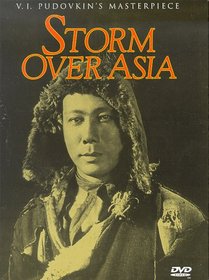| Actors: I. Inkizhinov, I. Dedintsev, Valery Inkijinoff, Aleksandr Chistyakov, Viktor Tsoppi Director: Vsevolod Pudovkin Creators: Anatoli Golovnya, I. Novokshenov, Osip Brik Genres: Indie & Art House, Classics, Drama, Military & War Sub-Genres: Indie & Art House, Silent Films, Drama, Military & War Studio: Image Entertainment Format: DVD - Black and White DVD Release Date: 05/18/1999 Original Release Date: 09/06/1930 Theatrical Release Date: 09/06/1930 Release Year: 1999 Run Time: 1hr 14min Screens: Black and White Number of Discs: 1 SwapaDVD Credits: 1 Total Copies: 0 Members Wishing: 2 MPAA Rating: Unrated Languages: English |
Search - Storm over Asia on DVD
  | Storm over Asia Actors: I. Inkizhinov, I. Dedintsev, Valery Inkijinoff, Aleksandr Chistyakov, Viktor Tsoppi Director: Vsevolod Pudovkin Genres: Indie & Art House, Classics, Drama, Military & War UR 1999 1hr 14min Soviet master filmmaker V. I. Pudovkin's "Storm Over Asia" is a revolutionary masterpiece. Described by critics as an "epic poem," "Storm Over Asia" is set in the remote region of Mongolia where a young man is mistaken as ... more » |
Larger Image |
Movie DetailsSimilar Movies
|
Movie ReviewsDazzling editing in powerful Soviet masterpiece Michael Gebert | 03/16/1999 (5 out of 5 stars) "Storm Over Asia/The Heir to Genghis Khan is one of those titles frequently seen in film history books but rarely seen on a screen. Good to have it at last, then, because it's one of the best films to come out of the Soviet 1920s-- a work of rat-a-tat editing on a par with Gance's Napoleon and an example of slowly-smoldering drama finally delivering with a vengeful wallop worthy of The Godfather. Pudovkin consistently displayed the human touch that colleagues such as Eisenstein and Dovzhenko lacked, and the story of a Mongolian peasant who is used as a puppet ruler by the British until he finally unleashes the force of his people upon them is gripping throughout. In short, a masterpiece that is also a cracking good movie." A Glorious Dose of Culture! Barbara (Burkowsky) Underwood | Manly, NSW Australia | 01/09/2005 (5 out of 5 stars) "After being impressed by some of Director Pudovkin's earlier films, I was curious to see "Storm over Asia" which is billed as 'Pudovkin's Masterpiece'- and I couldn't agree more! Unlike the other films I'd seen (End of St Petersburg, Chess Fever) this grand epic takes us to remote Mongolia for a real dose of authentic culture, complete with genuine Mongolians, their traditional homes, a lama and local Buddhist temple ceremonies. Excellent photography and attention to details already makes the cultural aspect a most interesting and exciting experience for the armchair traveller and dreamer of exotic places. Picture quality throughout is very good, and the music is outstanding, being an original score by Timothy Brock incorporating perfectly-suited Russian and Mongolian melodies and sounds. For the Buddhist temple ceremony even authentic instruments must have been used to replicate the music played on such occasions, making the cultural experience more than merely visual. The story itself blends fact with fiction, highlighting the plight of the Mongolian tribesmen who live a simple life, and are exploited by foreigners who want to profit from the fur trade. The focus is on one Mongolian who resists the exploitation, then by a twist of fate becomes the pawn for British troops in the region who want to use him to gain more control over the Mongolian natives. Politics and cultural identity make the plot, but a large part of the film's success is no doubt due to Pudovkin's skill in imagery and depicting emotions and drama with poignant images. An excellent film in itself, enhanced even more by its authentic filming location in Mongolia and genuine cultural experience." Incredible Clayton J. Hanson | Seattle, WA | 12/23/2002 (5 out of 5 stars) "I can't really add much to the only other review, but I, too, find it unfortunate that this film and much of Pudovkin's work has been largely made invisible due to the glare of Eisenstein (or if you're into cultural studies during the New Economic Policy, Protazanov and the other 'commercial' directors at Mezhrabprom-Rus). While this film represents Pudovkin at his peak, awash as it is in ethnographic detail, a real human story (instead of Eisenstein's cardboard cutouts), and the completely sublime use of his trademark 'bricking' montage, his other films (especially less famous ones like 'Chess Fever' and 'Deserter') deserve a look, too."
|






